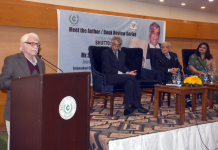Lahore, JUL 9: The Lahore High Court on Saturday granted bail to journalist Imran Riaz Khan in a petition seeking to either quash the 18 cases filed against him or consolidate them all into a single first information report (FIR).
Justice Ali Baqar Najafi took up the petition, which was moved by lawyers Shazib Masud, Mian Ali Ashfaq, Rana Abdul Maruf Khan and Mian Izhar Ahmed on Imran Riaz’s behalf.
The petition, requested the court to suspend the “operations of all … FIRs till the final decision of this case and direct the respondents to produce the petitioner before this honourable court and release the forthwith till the final disposal of the instant petition”.
The Punjab government and inspector general of police (IGP) were nominated as respondents in the petition.
Imran, who is facing charges of treasons in multiple cases, was initially taken into custody by Attock police near Islamabad on Tuesday night. He was later granted relief by a local court in the wee hours of Thursday, only to be immediately arrested by a team of Chakwal police outside the courtroom.
He was then shifted to Lahore, prior to which a local court of Chakwal district had allowed his judicial remand.
It emerged on Friday that Lahore police had handed over the journalist to the Crime Investigation Agency in a case pertaining to the abetment of mutiny and criticism of state institutions.
The hearing
At the outset of the hearing in the LHC today, Imran Riaz’s lawyer thanked the court for taking up the petition on a public holiday.
At this, Justice Najafi remarked: “It is our obligation, we have to protect the Constitution.”
The lawyer then told the LHC that his client had approached a court the very next day after an FIR was registered against him.
“But he was arrested at Islamabad Toll Plaza,” he said, claiming that police had concealed the record of the case in which Imran Riaz was taken into custody from the LHC in another plea.
The police, he alleged, “wanted to arrest Imran Riaz and that is why [they] did not inform the court about those FIRs”.
The lawyer claimed the incumbent government was suppressing opposing voices from journalists. PTI party leaders have on several occasions praised the journalist by name.
Ashfaq argued that multiple cases could not be registered on the same charge and that the journalist’s comments were based on good intentions. “Something said with good intentions is not a crime,” he added.
The lawyer maintained that Imran Riaz had said nothing against the army and the registration of cases against him was “nothing but retaliation”.
The counsel was asked about the punishment under Section 505 of the Pakistan Penal Code (statement conducing to public mischief) to which he responded it was seven years.
“We are all bound by the Constitution and the law,” Justice Najafi remarked in response.
When Ashfaq reiterated that the journalist had said nothing against any army representative, he was asked to read the contents of an FIR filed from Gujranwala.
“The contents of 95 to 98 per cent of all cases are exactly the same,” the lawyer said, adding that the Constitution allowed freedom of expression and once again said multiple cases could not be registered on a single charge.
“Anyone who defames his forces or spreads chaos in the country is [committing] a crime. It is not a crime if a person brings correct news in good faith,” Ashfaq contended.
He once again said that his client had said nothing against the military and there was no evidence present for any of the registered cases.
The lawyer argued that the police did not even have the authority to register such an FIR and it came under the Federal Investigation Agency’s domain.
“Imran Riaz never made the statement which he is being blamed for in the FIRs.”
He further argued that the FIRs said those who had liked the journalist’s alleged statement were also complicit in the crime, adding that two million people had liked his statement.
Justice Najafi remarked at this point that the journalist had a responsibility since people followed and watched him.
The hearing was then adjourned for half an hour and Punjab’s advocate general was summoned.
Upon resumption of the hearing, Punjab Advocate General Shahzad Shaukat said he had looked at the case file and a detailed response was needed.
He said he did not have any reservation about Imran Riaz being granted bail if the journalist guaranteed his appearance before a magistrate on the first day after Eid.
Justice Najafi ordered for the journalist to be presented in the courtroom and to give an undertaking that he would not deliver any controversial speech till his appearance before a magistrate.
Subsequently, Imran Riaz presented in court where Justice Najafi told the journalist that his lawyer had assured that he would say not make any statement which could further complicate matters.
The journalist said he had received justice from whichever court he went to.
“Don’t make us controversial. You find it flawed to go to court on Saturday when there is nothing strange about it,” the judge remarked.
Imran Riaz assured the court that he would not deliver any controversial statement. The judge, hence, accepted the journalist’s request and granted him bail, adjourning the next hearing till July 19.
The petition
The plea contended that Imran Riaz had been “working hard to provide and deliver information based on quality of truth and by doing that, he has been exposing illegitimacies and wrongdoings of everyone without any bias any distinguish (sic), call it (sic)” ruler or the institutions.
He had “always given his opinion based on his complete independent journalist[ic] view on all sorts of topics […] in the larger interest of public of Pakistan” and “exposed thousands of people and stories with no fear”, the plea said.
It maintained that the incumbent government was being “revengeful” against several journalists, including Imran Riaz.
The petition said Imran believed “more bogus cases” in the forms of FIRs or complaints against him were registered against him on behalf of “different unknown persons on the instructions and behest of the incumbent government and with the connivance and collusion of the respondents”.
It mentioned that Imran had sent a letter dated June 30 to the Punjab IGP, requesting details about any pending complaints/FIRs against him so that he may approach the relevant forum for an investigation and seek pre-arrest bail.
But due to “non-cooperation showed by the Punjab IGP”, the plea said, Imran filed a writ petition before the LHC, which then directed the Punjab police chief to submit on July 1 the record of cases and complaints against the journalist.
A report was then submitted on the matter by the Punjab government, the plea stated. However, it added, while the report showed the records of 17 FIRs registered against Imran, some of the complaints and FIRs were “deliberately and intentionally” concealed for the sole purpose of arresting the journalist “by whatever means to please the people in present [the] government on whose instructions these bogus FIRs were registered against the petitioner by the respondent no.1 through planted complainants”.
The petition said Imran then decided to approach the Islamabad High Court for protective/transitory bail but was arrested by Attock police at Islamabad Toll Plaza on July 5 at 10:30pm.
The plea further stated that the case in which Imran was arrested had been concealed from the LHC, terming it a “mala fide” act.
Imran was then presented before a judicial magistrate in Attock, the plea said, adding that the journalist was thereafter granted relief.
The petition further highlighted by that FIRs against Imran were similar in nature, “so much so [that] most of the FIRs contain word to word ditto content”. In this regard, the plea contended that no second FIR could be registered about the same incident.
“Moreover, the allegations made and offences attracted in the FIRs are barred by Section 196 of CrPC (Code of Criminal Procedure) and other offences are non-cognisable in nature for which no set procedure given under the law has been followed,” the plea read.
It contended that the FIRs were registered “through planted individuals”, whereas they were required to be registered either through “authorised representatives/officers empowered on behalf of either of federal or provincial governments — that too if the complaint made by order of — or under authority from either of federal or provincial government, which is completely missing in the aforementioned FIRs”.
The petition said that offences pertaining the Prevention of Electronic Crimes Act, 2016 in the FIRs could not be “entertained or adjudicated” by police as the Federal Investigation Agency was the designated authority for the purpose.
Hence, the FIRs were liable to be quashed, the plea said.
Moreover, the petition said Imran was “being dragged from one police station to another police station and then another police station and in the same manner facing the proceedings of physical remand / judicial remand”.
“If this wrangling is going to continue, the petitioner’s life is going to be wasted while facing the proceedings … of these number of FIRs one after another,” the petition read.
The petition further contended that offences alleged against Imran “are not attracted in the explained circumstances of the incident in aforementioned FIRs and allegations are vague in nature”.
In fact, it added, “the Respondent no.1, while acting malafidely (sic) tried to drag the petitioner unnecessarily and involved him in the said FIRs without any justifiable or substantial basis”.
The petition maintained that there was no “incriminating material” available on the record that may create any nexus of the petitioner with the alleged offences.
“Moreover, no such words uttered or spoken by the petitioner has been referred in the contents of FIRs, and also the FIRs are silent to the extent that if any such material has been attached with the complaints filed by the private individuals who informed [of] such crimes.”
The petition sought the quashing of all “18 FIRs or its proceedings as none of the offences can be attracted in given set of facts and circumstances explained in the narration of said FIRs, due to lack of jurisdiction as well non-fulfilment [of] procedural requirements as mentioned in section 196 and 155 of CrPC”.
Otherwise, the petition added: “As an alternative, consolidate all the FIRs and the petitioner be investigated, or prosecuted, or tried under only one FIR in the large interest of fair, transparent and equitable justice.”

















